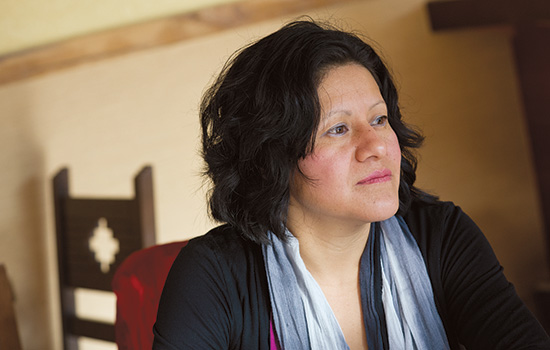From farmworker to advocate
Martin Gordon, an associate professor in CAST, stands with Librada Paz ’03 after she received the 2012 Robert F. Kennedy Human Rights Award.
Librada Paz was 15 years old when she left Oaxaca, Mexico, with her older sister for what she hoped would be a better life in the United States.
They joined their brothers in Ohio and immediately went to work in the fields harvesting tomatoes. When tomato season ended, they migrated with other workers to New York to pick apples and then to Florida to pick oranges.
“I did not like farm work,” she says. “The bending was so painful. And you get so tired and dirty. As a farmworker there is no option but to accept all working and living conditions as they are.”
The living conditions were just as challenging as the long hours and grueling heat. Paz slept on the floor in a small room with as many as 10 other people. She was one of only a few females and was sexually and physically abused.
She knew education was the way out. She didn’t know back then, as a teenager, that it would be a way to make a better life for other migrant farmworkers.
In November, Paz ’03 (mechanical engineering technology) received the 2012 Robert F. Kennedy Human Rights Award because of her leadership in New York’s farmworker human rights movement. The Robert F. Kennedy Human Rights Award was established in 1984 to recognize people who stand up to oppression at grave personal risk in the nonviolent pursuit of human rights.
Paz received the 29th annual prize for her work with Rural Migrant Ministry, an organization that focuses on erasing the systemic violence and human rights violations that America’s farmworkers and migrant laborers face. She joins past recipients from 26 countries.
“I do not have the words to describe how honored I feel to receive this award,” she says. “I wasn’t expecting that high of an honor.”
After three years of migrating, Paz settled down in Brockport, N.Y., and attended high school. From there she took classes at Monroe Community College and transferred to RIT after talking to professors, who helped her zero in on mechanical engineering technology because she wanted to design machines.
Paz continued working in the fields to pay for college. She also raised her son, Brandon Nieves, who is now a hospitality student in the College of Applied Science and Technology.
“It was tough,” she says. “We struggled. I didn’t have enough time. I didn’t know enough English. Engineering English was hard. But I loved it.”
Paz made time to create awareness about the poor conditions of farmworkers. Richard Witt, executive director of Rural Migrant Ministry, met Paz more than a decade ago at a protest.
Soon Paz was leading workshops for migrant workers and lobbying in Albany for better working conditions. She began volunteering at an overnight camp for children, helped organize a statewide conference for rural female farmworkers and organized visits to migrant camps so others could see the sub-standard housing. “Librada is first and foremost a bridge builder,” Witt says. “She helps bring people from different backgrounds into a relationship.”
The partnership with the Robert F. Kennedy Human Rights Center will strengthen that bridge and help extend Paz’s voice. Paz says her next goal is to help get a farmworkers labor protection law passed in New York.
Martin Gordon, an associate professor in the College of Applied Science and Technology, says Paz was one of the most inspirational students he has known. Gordon attended the awards ceremony in November.
“This is a great example of someone using their RIT education in unexpected ways,” he says. “The mechanical engineering technology program has always prepared its students to solve real-world problems. Libby has certainly been instrumental in tackling a very difficult real-world problem.”
 Librada Paz ’03 works with Rural Migrant Ministry to make conditions better for migrant laborers. Paz is a former farmworker herself who realized as a teenager that education was the way out.
A. Sue Weisler
Librada Paz ’03 works with Rural Migrant Ministry to make conditions better for migrant laborers. Paz is a former farmworker herself who realized as a teenager that education was the way out.
A. Sue Weisler









